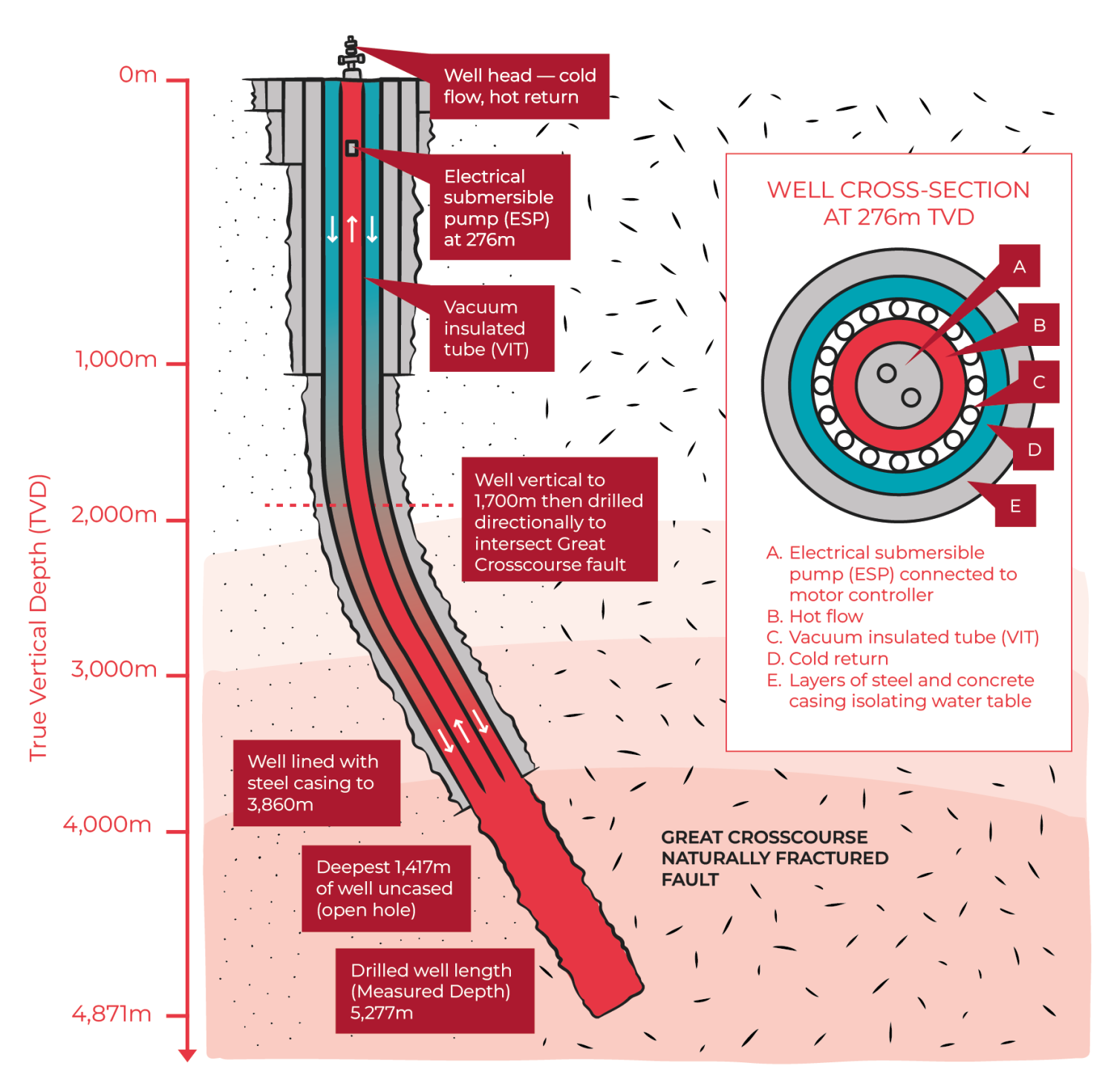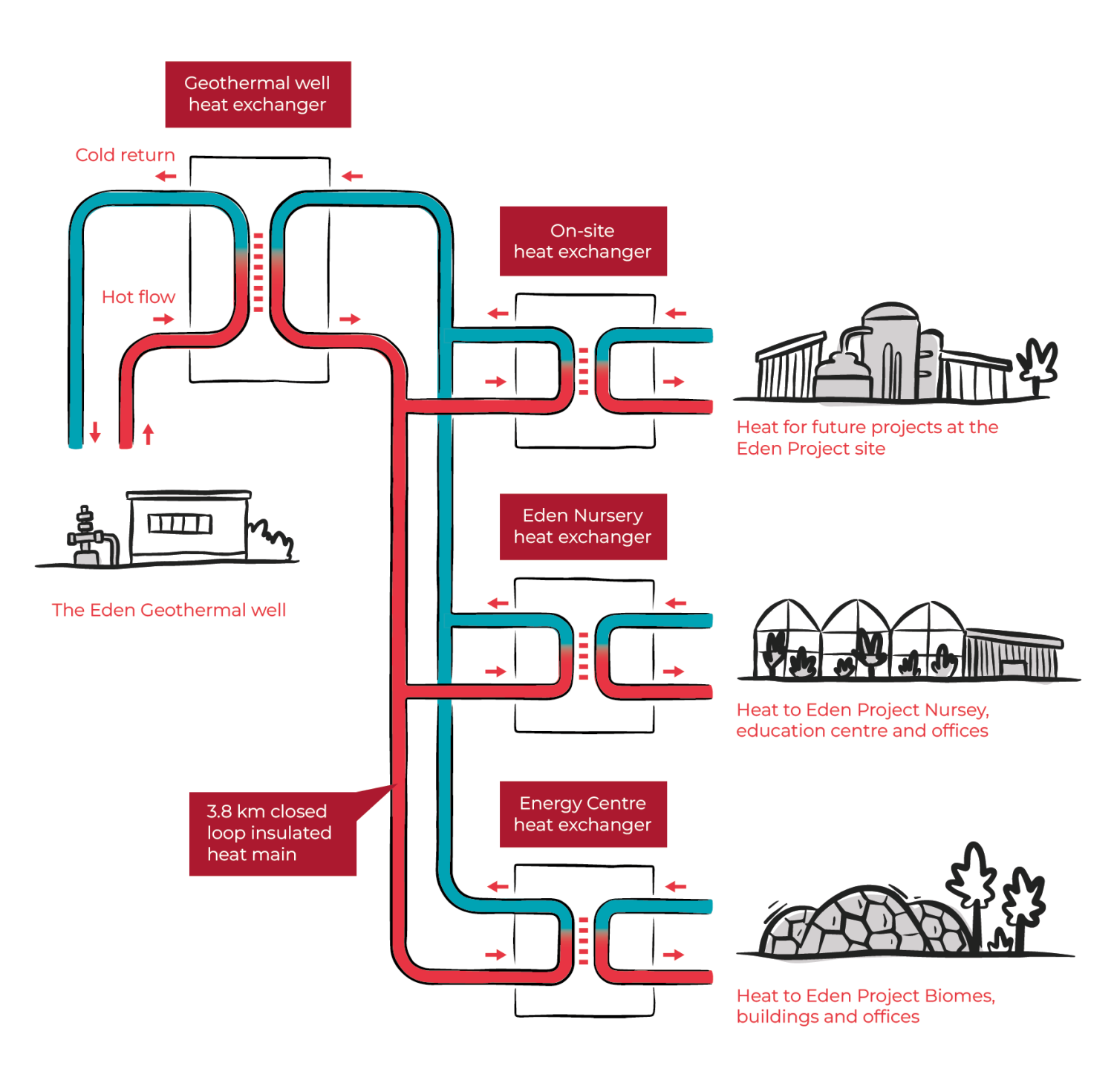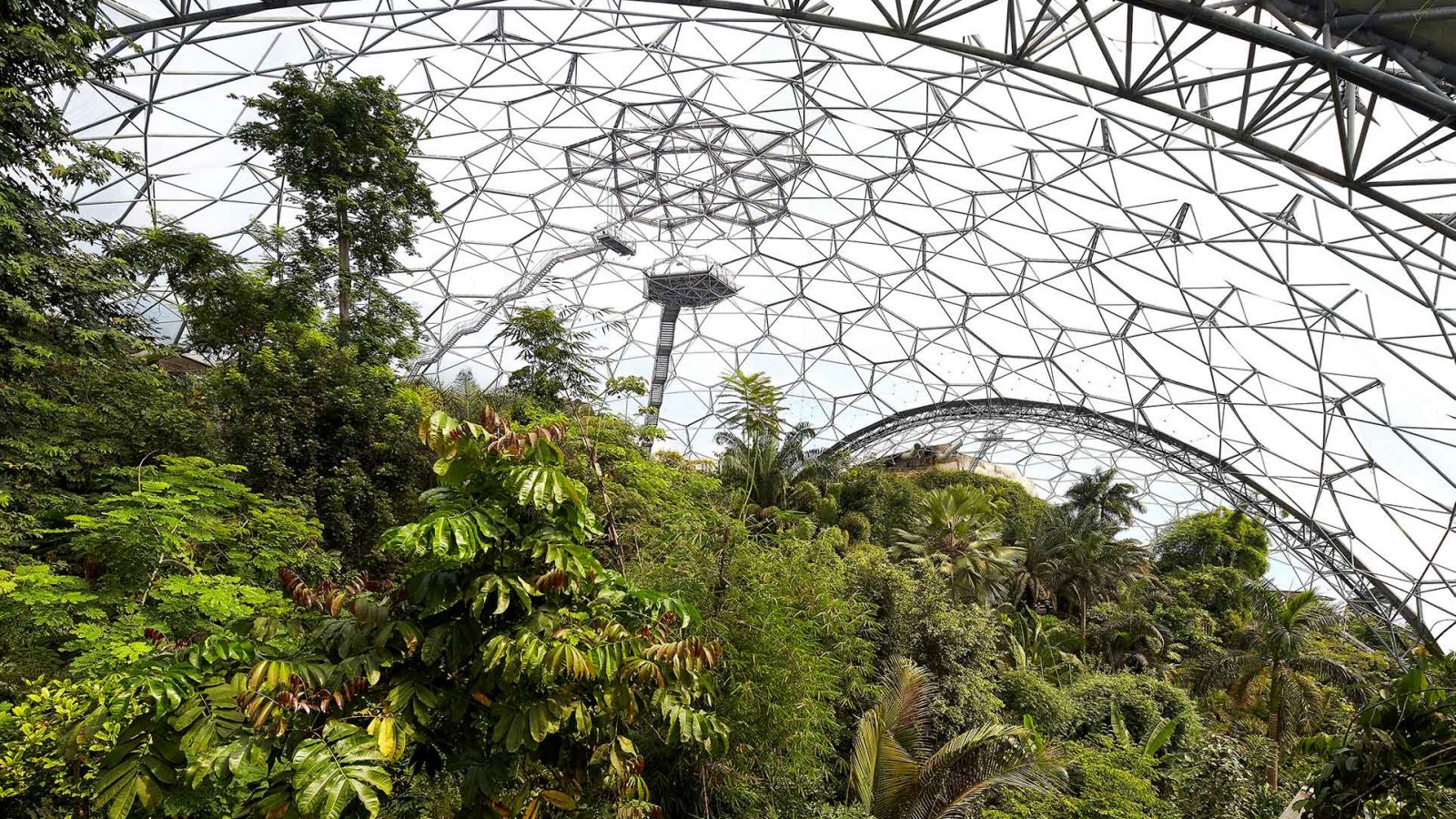The Eden Geothermal Project is an industrial research project co-funded by the European Union through the European Regional Development Fund and Cornwall Council, with commercial funding from Gravis Capital Management.
The project is to decarbonise the heat supply to the world-famous Biomes, new commercial greenhouses and other buildings at the Eden Project by creating a deep geothermal heating system.
In addition to getting the Eden Project off gas and demonstrating the greenhouse gas savings obtainable through deep geothermal heating, research undertaken by the University of Exeter is building on our knowledge of deep geothermal resources in Cornwall, and improving our understanding of the geology at depth, to unlock future geothermal development.
Project programme
The project has been completed in stages:
- Design, preparation and procurement of specialist services;
- Site works;
- Drilling, completion and testing of the deep well;
- Installation of a heat main to Eden;
- Heat production / supply to Eden, with a greenhouse gas savings calculation.
Project preparation
Project design, planning and public procurement of the £20m of contracts to complete the programme were undertaken in-house by the EGL team.
Site works
Enabling works to prepare the site for drilling were undertaken by specialist contractors. The site is the former ‘Tomato car park’ on the edge of the Eden Project estate, formerly an area of rough scrub partly used as a landfill site and including an area of wet woodland (which has been retained and protected).
The site works included: ground levelling; erection of a perimeter fence; creation of site access; construction of roadways, drill pad, wellhead cellars and lagoons; site drainage and flood alleviation; erection of site buildings; installation of seismic monitoring network; installation of services and conductor pipe. A dedicated public viewing area was also created.
Drilling
Drilling EG-1 – the UK’s longest deep geothermal well – started in May 2021 and was completed in October the same year. EG-1 is a deviated well drilled to a vertical depth of 4,871 metres (measured depth or total length of 5,277m) using conventional rotary drilling with muds. The upper three sections have been lined with steel casing, but the bottom section has been left as an open hole.
For more detail on drilling EG-1, visit our Drilling and Operations page.
Well testing
When EG-1 had been successfully drilled, we carried out a series of well tests. Well tests provide essential information on the hydrogeological characteristics of the target rock zone.
Our programme was designed by the team in conjunction with University of Exeter, in response to the conditions encountered during drilling, with the aim of maximising the level of understanding of the petrography, hydrogeology and geomechanical conditions of the rock at 4,500m. The main technical aims were to:
- characterise the permeability/impedance of the target zone;
- evaluate the spatial extent of fracture distribution and orientation in the target zone;
- characterise the flowing zones and evaluate the ‘far-field flow contribution’;
- use the data acquired to generate models to understand the regional geothermal resource.
You can find more detail about our well testing programme here.
Installation of the heating system and heat supply to Eden Project
To enable us to extract heat from EG-1 and supply heat to Eden Project, we have created a single well heat exchanger and installed a new 3.8km heat main to link the geothermal site with the heat loads on the Eden Project site.
The single well heat exchanger has been created by installing a coaxial circulation system in the well itself.
- Vacuum-insulated tubing was installed to a depth of 3,850m in the centre of the well.
- The tubing serves as the conduit for hot water being pumped to the surface.
- At the surface, a plate heat exchanger extracts heat from the well water, and the newly-cooled water travels back down the annulus (outer ‘ring’) of the well to be reheated at depth, in a continuous circulation.

The plate heat exchanger at the surface of the well site transfers heat to the new heat main, which transports it to the heat loads on the Eden Project site: the Eden Energy Centre (for the Biomes and other buildings) and Growing Point – Eden’s newly-constructed commercial greenhouses and associated buildings.

The heat main consists of two 150mm (6”) steel pipes – a flow and a return – each encapsulated in a thick layer of insulation to a total diameter of 280mm and linking the deep geothermal borehole with the heat loads at Growing Point and the Eden Energy Centre. There, plate heat exchangers extract the heat for use in Eden’s heating circuits. Meanwhile, the newly-cooled water in the heat main travels back to the geothermal site to be reheated. All but a very short stretch of the heat main was installed below ground, although a short stretch behind Eden Project’s main office building is visible. This short film was made by our contractors during the installation works and shows how the heat main was constructed.
Project delivery partners
Eden Project Limited, a wholly owned subsidiary of the Eden Trust, a registered charity in the UK.
www.edenproject.com

EGS Energy Limited, a leading geothermal development and consultancy group with experience on commercial scale projects around the world. The EGS Energy team have significant experience and expertise, having been part of the Hot Dry Rocks geothermal programme in Cornwall in the 1980s, the follow-on EU programme in Soultz-sous-Forêts, France and the subsequent commercial power generating projects in Landau and Insheim, Germany.
www.egs-energy.com

Bestec (UK) Limited, which is affiliated with Bestec GmbH based in Germany and the team has over 70 years of direct experience in the deep geothermal sector, both in the UK and internationally, including extensive experience of drilling deep wells in granite.
www.bestec-for-nature.com

University of Exeter is a delivery partner providing research services to Eden Geothermal. The University of Exeter combines teaching excellence and high levels of student satisfaction with world class research at campuses in Exeter and Cornwall. It is a member of the Russell Group of leading research-intensive universities.
www.exeter.ac.uk

Funding
European Regional Development Fund
The ERDF has provided £16.2m under its Priority Axis 4: “Supporting the Shift Towards a Low Carbon Economy in All Sectors”. The investment comes under the categories:
- Investment Priority 4a
Promoting the production and distribution of energy derived from renewable resources. - Investment Priority 4f
Promoting research and innovation in, and adoption of, low-carbon technologies


Cornwall Council
Cornwall Council has provided £1.4m in support of both its economic development programme and its vision for a low carbon energy future, which aims to:
- Reduce fuel poverty to 5%
- Meet 100% of electricity demand from renewables
- Retain 30% of energy spend in the Cornish economy
- Develop 50% locally owned generation
- Reduce fuel bills by 20%
- Create 4000 green jobs

Gravis Capital Management
Gravis Capital Management has contributed £6.5m to the project through GCP Infra. GCP Infra is a FTSE 250, closed ended investment fund traded on the LSE, which invests in UK infrastructure projects with long-term, public-sector backed revenues.
The fund is managed by Gravis Capital Management, an investment management firm with £3bn of AUM. It launched its first product, A UK-listed fund focused on proving debt for UK infrastructure projects, in 2010. Subsequently, it has launched five further funds, including two closed ended funds (a student accommodation REIT and another infrastructure debt fund) and three OEICs focused on listed infrastructure, clean energy and listed UK real estate investment trusts.
Gravis has 44 staff and is headquartered in Savile Row, London. Gravis is authorised and regulated in the UK by the Financial Conduct Authority.










